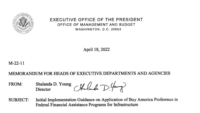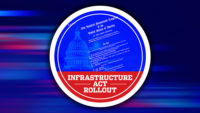Representatives of major construction and transportation groups say that highway and transit funds from the Infrastructure Investment and Jobs Act continue to move out, financing active projects around the country at a solid pace.
But they also say the law’s impact is being hampered by the increased cost of construction materials, and by Biden administration regulations for implementing the law, including those dealing with its Buy America requirements.
Officials outlined their views at a March 28 hearing of the House Transportation and Infrastructure (T&I) subcommittee on highways and transit. The T&I Committee has jurisdiction over more than $500 billion of IIJA funding, said subcommittee Chairman Rick Crawford (R-Ark.).
The hearing is one of the committee's earliest dealing with infrastructure since Republicans gained control of the House in last year's elections. [View video of hearing and witnesses' prepared statements here.]
Crawford said that in the 16 months since the IIJA was signed into law, the Federal Highway Administration and Federal Transit Administration have distributed about $157 billion in IIJA formula funds to states and regional and local agencies. He said the U.S. Dept. of Transportation has announced discretionary grants totaling an additional $9.6 billion.
But Crawford also said that “there are very important areas where progress has stalled.”
He added, “In some cases, the administration is creating confusion among states and stakeholders, which could result in needless project delays.”
Rep. Rick Larsen (Wash.), the full T&I Committee's top Democrat, said that the IIJA is not a "set-it and forget-it" measure.
Larsen said, "We now need to follow through by Congress, state DOTs, cities, counties, transit agencies, tribal governments, private industry—all of us working together to deliver these projects so communities get the maximum bang for the buck."
Paula Hammond, senior vice president for WSP USA, said that more than 29,000 highway improvement projects moved forward in 2022, “in every congressional district," up by 2,500 projects from 2021.
Projects in All Congressional Districts
Hammond, who was representing the American Road & Transportation Builders Association at the hearing, said state DOTs also have committed highway formula funds for 7,400 projects in the first four months of fiscal year 2023, which is 3,000 more than in over same period in 2022.
But she added, “Increased material costs and supply chain challengers undoubtedly have had a dilutive effect on the law’s investments” Hammond said, “That said, it’s also clear this situation would have been dramatically worse if Congress opted for another flat-funded extension of the surface transportation programs.”
Looking at the bigger picture, Hammond said, “We are just 16 months into the five-year infrastructure law." She added, Highway, bridge and public transportation investments are working as intended. Many more benefits to the American people are yet to come.”
TxDOT Index Up 35%
Marc Williams, executive director of the Texas DOT, said states’ biggest challenge is addressing the large increase in highway fatalities, include the deaths of six workers on a jobsite on the Baltimore Beltway on March 22.
Like other witnesses, Williams said inflation is another concern, noting that the Texas highway cost index has risen by 34.7% in the March 2022 to March 2023 period, thus "effectively eroding the gain in federal buying power offered through the IIJA."
Williams also said that applying for U.S. DOT discretionary grants can pose challenges, adding it can cost as much as $200,000 to develop a grant application and even if a project is selected for a DOT grant, it can take as long as 18 months to receive the grant funds from U.S. DOT.
NSSGA and Buy America Exclusions
Dwayne Boyd, president of the Mid-South region with building materials company CRH Americas, praised lawmakers for producing an infrastructure law that boosts funding significantly and and extends for five years, thus providing longer-term funding and planning stability than short-term funding extensions would.
Boyd, representing the National Stone, Sand & Gravel Association, also said NSSGA wants to ensure that the IIJA’s statutory exemption from Buy America requirements for aggregates, liquid asphalt and other paving-related construction materials will remain in place.
Crawford and witnesses said the Office of Management and Budget has issued initial guidance on implementing the Buy America program, but has yet to publish final guidance.
ABC: 'Record Inflation'
Aric Dreher, assistant general manager for contractor Cianbro Corp., representing Associated Builders and Contractors, said that his company has faced "record inflation, supply chain delays and workforce shortages."
Dreher said that since the IIJA was enacted in November 2021 input prices for construction projects have risen by 11.1%.
He also said that many in the construction industry have found it hard to find "consistently available" specialized construction equipment.
Dreher said the process for getting waivers from Buy America requirements is “cumbersome” and could make delays worse in acquiring some types of materials.





